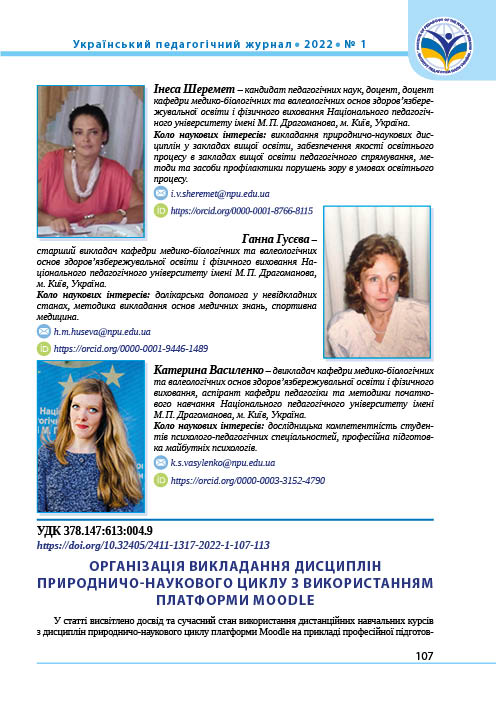Abstract
The article highlights the experience and current state of use of distance learning courses in the disciplines of the natural science cycle of the Moodle platform on the example of professional training of students majoring in 014 Secondary Education (Human Health) at the National Pedagogical Dragomanov University.
The purpose of the article is to describe the peculiarities of teaching the disciplines of the cycle of natural science training using the Moodle platform.
Methodology. To outline the features of teaching the disciplines of the natural science cycle with the use of distance learning courses Moodle in training students majoring in 014 Secondary Education (Human Health) used a set of methods: theoretical methods – general (to justify the initial theoretical positions), special methods: structural method (for identification and delineation of features of distance education for students of the above specialty) and problem-thematic method (to highlight real and future opportunities for distance learning courses Moodle platform), generalization method (to formulate research conclusions); empirical methods – content analysis, surveys and questionnaires of students.
The scientific novelty of the study is to present the practical experience of the authors, analysis of opportunities and challenges, strengths and weaknesses of teaching science disciplines using distance technology, including the Moodle platform, to train future professionals in 014 Secondary Education (Human Health). Recommendations for improving, implementing and designing distance learning courses of the Moodle platform in the educational process of professional training of students majoring in 014 Secondary Education (Human Health) in higher education institutions (on the example of the National Pedagogical Dragomanov University) are given with specific examples.
Conclusions. Among the main advantages of using the Moodle platform for teaching the disciplines of the natural sciences cycle, we highlight free access to education, breadth of coverage, convenience, mobility, individual approach. The main disadvantages are the problems of motivation, identification and development of students’ communication skills. We believe that the research materials will be useful for teachers of higher education institutions involved in the development of distance learning courses and tests for the Moodle platform, as well as students who use this system during distance or mixed educational process. Although the study was conducted on the basis of the National Pedagogical Dragomanov University, its results can be useful for the organization of educational activities in educational institutions of any level of accreditation.
References
Белан, В. (2020). Використання дистанційного навчання в університетах Республіки Польща в умовах пандемії коронавірусу. Імплементація європейських стандартів в українські освітні дослідження: Збірник матеріалів ІV Міжнародної наукової конференції Української асоціації дослідників освіти (26 червня 2020 р.). Дрогобич, Україна.
Страшко, С.В., Кривич, І.П., Гусєва, Г.М., Білик, В.Г. (2019). Інфекційні та неінфекційні хвороби, що набули соціального значення: додаток до підручника з основ медичних знань для студентів педагогічних спеціальностей закладів вищої освіти. Київ, Україна.
Триус, Ю.В., Герасименко, І.В., Франчук, В.М. (2012). Система електронного навчання ВНЗ на базі MOODLE: методичний посібник. Черкаси, Україна.
Тарасенко, К. (2021). Дистанційне навчання студентів-медиків в умовах карантину. Реалії, проблеми та перспективи вищої медичної освіти: Матеріали навчально-наукової конференції з міжнародною участю (25 березня 2021 року). Полтава, Україна.
Bilyk, V., Matvienko, O., Zinko, O., Hanushchyn, S. & Vasylenko, K. (2021). Cognitive Technologies in Pedagogical and Natural Science Training for Future Psychologists in Post-Pandemic Education. Postmodern Openings, 12(1Sup1), 323–334. https://doi.org/10.18662/po/12.1Sup1/288
Bilyk, V., Sushchenko, L., Sheremet, I., Hanushchyn, S. & Bondarenko, H. (2020). Modern Pedagogical Practice of Natural Science Training of Future Psychologists in Higher Educational Institutions. Revista Romaneasca Pentru Educatie Multidimensionala, 2020. 12(3). 162–181. https://doi.org/10.18662/rrem/12.3/315
Ustawa z dnia 2 marca 2020 r. o szczególnych rozwiązaniach związanych z zapobieganiem, przeciwdziałaniem i zwalczaniem COVID‑19, innych chorób zakaźnych oraz wywołanych nimi sytuacji kryzysowych. (2020). http://prawo.sejm.gov.pl/isap.nsf/download.xsp/WDU20200000374/U/D20200374Lj.pdf
Belan, V. (2020). Vykorystannia dystantsiinoho navchannia v universytetakh Respubliky Polshcha v umovakh pandemii koronavirusu. Implementatsiia yevropeiskykh standartiv v ukrainski osvitni doslidzhennia: Zbirnyk materialiv IV Mizhnarodnoi naukovoi konferentsii Ukrainskoi asotsiatsii doslidnykiv osvity (26 chervnia 2020 r.). Drohobych, Ukraina. (in Ukrainian).
Strashko, S.V., Kryvych, I.P., Husieva, H.M., Bilyk, V.H. (2019). Infektsiini ta neinfektsiini khvoroby, shcho nabuly sotsialnoho znachennia: dodatok do pidruchnyka z osnov medychnykh znan dlia studentiv pedahohichnykh spetsialnostei zakladiv vyshchoi osvity. Kyiv, Ukraina. (in Ukrainian).
Tryus, Yu.V., Herasymenko, I.V., Franchuk, V.M. (2012). Systema elektronnoho navchannia VNZ na bazi MOODLE: metodychnyi posibnyk. Cherkasy, Ukraina. (in Ukrainian).
Tarasenko, K. (2021). Dystantsiine navchannia studentiv-medykiv v umovakh karantynu. Realii, problemy ta perspektyvy vyshchoi medychnoi osvity: Materialy navchalno-naukovoi konferentsii z mizhnarodnoiu uchastiu (25 bereznia 2021 roku). Poltava, Ukraina. (in Ukrainian).
Bilyk, V., Matvienko, O., Zinko, O., Hanushchyn, S., & Vasylenko, K. (2021). Cognitive Technologies in Pedagogical and Natural Science Training for Future Psychologists in Post-Pandemic Education. Postmodern Openings, 12(1Sup1), 323–334. https://doi.org/10.18662/po/12.1Sup1/288 (in English).
Bilyk, V., Sushchenko, L., Sheremet, I., Hanushchyn, S., & Bondarenko, H. (2020). Modern Pedagogical Practice of Natural Science Training of Future Psychologists in Higher Educational Institutions. Revista Romaneasca Pentru Educatie Multidimensionala, 2020. 12(3). 162–181. https://doi.org/10.18662/rrem/12.3/315 (in English).
Ustawa z dnia 2 marca 2020 r. o szczególnych rozwiązaniach związanych z zapobieganiem, przeciwdziałaniem i zwalczaniem COVID‑19, innych chorób zakaźnych oraz wywołanych nimi sytuacji kryzysowych. Retrieved from: http://prawo.sejm.gov.pl/isap.nsf/download.xsp/WDU20200000374/U/D20200374Lj.pdf
(in Polish).

This work is licensed under a Creative Commons Attribution-NonCommercial-ShareAlike 4.0 International License.

